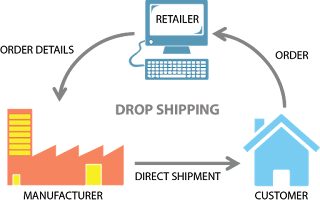ONLINE EARNING BY DROP SHIPPING
Drop shipping is a supply chain management method in which the retailer does not keep goods in stock but instead transfers the customer orders and shipment details to either the manufacturer, another retailer, or a wholesaler, who then ships the goods directly to the customer. As in retail business, the majority of retailers make their profit on the difference between the wholesale and retail price, but some retailers earn an agreed percentage of the sales in commission, paid by the wholesaler to the retailer.
BENIFITS
BENIFITS
Two significant benefits of drop shipping are a positive cash-flow cycle and the elimination of upfront inventory. A positive cash flow cycle occurs because the seller is paid when the purchase is made. The seller usually pays the wholesaler using a credit card or credit terms. Therefore, there is a period of time in which the seller has the customer's money, but has not yet paid the wholesaler.
Drop shipment can also be an advantage in some transactions since it (can) obscure the actual shipper from the final receiver, thus preserving a middleman's role by preventing direct communication/awareness between the original seller and final buyer, without requiring a middleman to bear the costs and cause delay in physically taking in the goods, repackaging, relabeling, etc.
If would be store owners are looking for the passive income sources online, drop shipping may be an opportunity to seek out. The business framework requires little to no investment. Owners need to have a website and marketing skills to move products. Apart from the website, they can also run promotions on various platforms such as Google Adwords, Facebook, e-mail marketing, and Bing ads to drive traffic to their website and grow sales.
Risks
DIVERSITY
Drop shipping offers those interested in diverse product lines the ability to switch merchandise up without severe fiscal repercussions, which is not possible when owning a brick-and-mortar or non-drop shipping e-commerce store.
Suppose, a store owner spends their money buying products of a particular niche, and, unfortunately, it is not bringing desired results. The store owner must continue with that niche product until it gets sold out, which could take some time and money promoting said products. This may bring losses to the store owner. On the other hand, if the store owner focuses on a drop shipping or turnkey business, they will have diverse options to choose products from. If a particular product is not deriving optimum sales, the drop shipping owner can easily switch to other items.
RISKS
Some risks such as back ordering may occur when a seller places a shipment request with a wholesaler, but the product is sold out. Back orders may be accompanied by a long wait for a shipment while the wholesaler waits for new products, which may reflect badly on the retailer. A good wholesaler will keep retailers updated, but it is the business owner's job to be aware of the quantities that the wholesaler has available. To keep inventory information and product data up to date, drop ship representatives are often employed. They serve as bridge between wholesaler and retailer.


Comments
Post a Comment